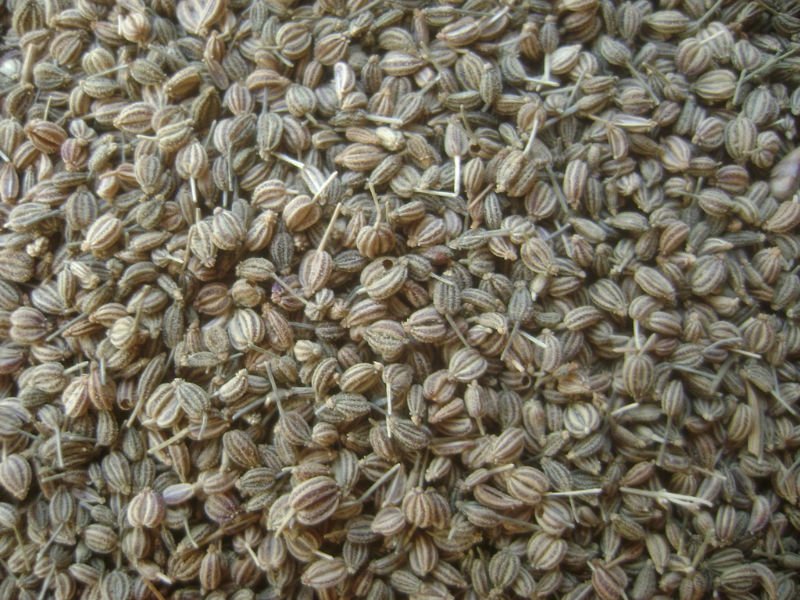Ajwain

More Information about Filters of Newsha Pyramid Tea Bags
2019-04-23
Aloe Vera
2019-06-11Common Name
Ajwain
Scientific Name
Trachyspermum ammi L.
History
Ajwain is most probably originated from Egypt, however; it is currently cultivated across the Middle East. This ancient plant has been used as medicine just like other spices.
Health Benefits
1. Improving Digestive System Function
Ajwain is made of Thymol which improves digestion, treats indigestion and Tympanites and reduces nausea. An article published in the Journal of Natural Remedies has proved that this plant stimulates secretion of gastric acids, improves digestion process. It can also reduce food transit time in digestion system. Moreover, it increases lipase and amylase in pancreas.
2. Improving Respiratory Tract Function
In an article published in the Journal of Natural Remedies, the effect of Ajwain seed oil on coughing has been studied. The results have shown that Ajwain seed significantly decreases coughing. In another study exploring the effect of Ajwain on asthma, it’s been observed that Ajwain extract has a positive effect on respiratory system and can be used as a medicine similar to theophylline. In other studies, this plant has shown inhibitory effects on histamine (H1) receptors in trachea of guinea pigs. According to the researchers, the positive effect of Ajwain on respiratory system is associated with the presence of Carvacrol in it.
3. Improving Liver Function
The protective effect of Ajwain on rats’ livers has been investigated in a study published in the Journal of Ethnopharmacology. The study has concluded that Ajwain methanol extract protects the rats’ livers against the negative effect of Paracetamol and adjusts liver enzyme, alkaline phosphatase (ALP) and aminotransferase (AST and ALT) when the liver is damaged. The effects of Ajwain on liver toxicity resulted from Hexachlorocyclohexane (HCH) in rats is reported in another study which has been published in the Journal of Food and Chemical Toxicology. The study has revealed that HCH increases lipid peroxidation, decreases glutathione, reduces the activity of superoxide dismutase, catalase and Glucose-6-phosphate dehydrogenase in liver which all are considered to be negative for liver. Ajwain lowers lipid peroxidase amount in liver and increases the aforementioned enzymes activity, eliminating the HCH toxic effect.
4. Regulating Blood Cholesterol Levels
In a study conducted in vivo, Ajwain seed powder has shown to have a positive effect on lipid profile, reducing the total cholesterol, negative cholesterol and triglyceride. The results of another study on the effects of Ajwain on blood lipids of patients with hyperlipidemia published in the Journal of Drug Delivery and Therapeutics has indicated that this plant reduces negative cholesterol and increases positive cholesterol. According to the study, niacin and Thymol in Ajwain are classified as cholesterol regulating agents, keeping cardiovascular system healthy. Moreover; the cholesterol-lowering effect of this plant may be resulted from its reduction effect on enterohepatic circulation in liver (circulation of substances between liver and intestine).
5. Anti-Pain
According to a study published in the Iranian Journal of Medicinal and Aromatic Plants, Ajwain relieves the chronic pain resulted from formalin in rats. According to the researchers, the pain relief effect of Ajwain may be resulted from Thymol and essential lipid acids existed in the plant extract, which both activate the choline in central nervous system. Choline is one of the pain relief mechanisms which relieve tonic and continuous pains.
In another study conducted on laboratory animals and published in the Journal of Pharmacy, the researches has found that Ajwain alcoholic extract can be used as a pain relief substance. According to the study, this pain relief effect is a quick and long-lasting effect. This extract is consisted of alkaloids, flavonoids, steroids and polyphenols which are all pain relief compounds.
6. Alleviating Peptic Ulcer Disease
The effects of omeprazole and Ajwqain hydroalchoholic extract on treatment of peptic ulcer disease resulted from ibuprofen usage in mature rats has been investigated. The results have shown that Ajwain extract treats peptic ulcer disease in rats depending on its dosage. The Ajwain-treated group has shown significantly lower and smaller sores compared to the sores of omeprazole-treated group. The liver enzymes were also increased in the Ajwain-treated group. It is not clear how the Ajwain extract treats peptic ulcer disease. However; comparing this plant effect with omeprazole effect, it is probable that this plant effects on the secretion of gastric acid just like omeprazole. It is also possible that the anti-oxidant effect of this plant plays a role in treatment of this disease.
7. Regulating Blood Pressure
A study published in the Journal of Pharmacy Research has concluded that Ajwain extract can lower blood pressure depending on the consumed dosage. This extract has lowered blood pressure from 6% (dosage: 3 mg/kg) to 42% (dosage: 100 mg/kg). Thymol results in a lower blood pressure. This plant also consists of a calcium channel blocking compound which itself can be a reason for lowering blood pressure.
Bioactive Compounds
Thymol, Cymene, Alpha-Pinene, Dipentene, Gamma-Terpinene, Beta-Pinene, Myrcene, Carvacrol, Terpinene-4-ol, Carvone, Limonene, Dillapiole, Oleic acid, Linoleic acid, Palmitic acid and Petroselinic acid.
Traditional Use
In traditional medicine, Ajwain has been used as an anti-tympanites, anti-nausea, anti-pinworm, diuretic and mucus secretor. It is known to be anti-pinworm as it contains Thymol, while its anti-spasm and anti-tympanites effects are attributed to its volatile essence.




